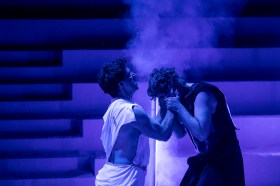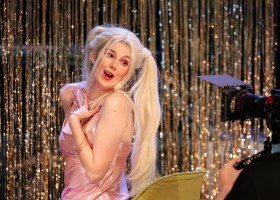I was lucky enough to catch Lucie Thorne at that Blue Mountains’ bastion of good music, The Clarendon, on a clear autumn night with only a handful of appreciative fans in the room. I knew nothing of her work and had been drawn to the gig by a scruffy poster pasted up somewhere on Katoomba Street. I’ve since learned that Thorne has been favourably compared to Cat Power, PJ Harvey, Margo Timmins, Shawn Colvin and Gillian Welch, comparisons which, although flattering for the recipient, are not especially useful to a critic when considering the work of a singularly distinctive artist.
The last time I saw a solo singer-songwriter backed by a full drum kit was at a memorable Tony Joe White gig at The Basement way back in the day, so it was with some surprise and a little excitement that I noted the lovely Guild semi-acoustic electric standing next to a well equipped drum kit with no evidence of any other instruments. Surprise turned to intense anticipation when Thorne took the stage with legendary drummer Hamish Stuart, a man whose impeccable musical credentials include a long stint as part one of the rhythm section for the late, great Jackie Orszaczky, part two being bass player Dave Symes. Lucky Lucie Thorne had the benefit of the Symes-Stuart collective experience when they collaborated with her as co-producers on her most recent album Black Across the Field and the results were on show that night at The Clarendon.
Thorne has a pillow talk voice that draws the listener into an intimate relationship with her songs. Her stage presence is quietly confident and assured her guitar playing has a moody minimalism which in combination with spare, nuanced melodies allows lots of open space for Stuart to layer the live sound with filigrees of cymbal and brushes, bells and assorted tinkling supported by a steady, perfectly placed pulse. I found myself drawn in quiet awe to Stuart’s low key solo spots, executed in sympathetic precision with Thorne’s playing. The intense communication between the two musicians pulls the listener into stories told in songs set against the philosophical and emotional terrain of that enduring leitmotif of alt.country, the musician on the road.
As a lyricist, Thorne is drawn to the country noir genre, as the title of her latest record suggests. When the Lights Go Down is told in the first person, present tense voice of a fan in a crowd watching the performance of an artist she is clearly besotted with. In a deft twist Thorne reverses the roles giving the scenario a slightly sinister, narcissicistic edge.
When the lights go down, I’ll be staring out
I want you to know this feels like my private show.
In Under the Night, Thorne opts for a heavily distorted guitar sound that cuts against the sexy sweetness of her vocals. The tone is perfectly judged for the delivery of a story of unrequited desire.
The blinds are up, I’m watching the sky
I can’t sleep, it’s been the longest night
Replaying what you said
It churns with the chop and whir of the fan above this bed
I’m on fire
I wanna be by your side
Driving down these thoughts of you
Another lousy night in another noisy room
But that ‘what would it be like’
Keeps clamouring underneath
all these other people’s dogs and cars and fights
In Before The Cold, Thorne delivers a beautiful, almost elegiac poem in the voice of a mother whose two sons have gone to war, giving a telling insight into the private world of families caught up in the deadly theatre of global conflict.
Hold on, I hold on to the past
Before the cold crept inside
You had the clearest eyes
Your father and I
Watched you wonder, laugh and cry
For gentler things.
In live performance, Lucie Thorne moves effortlessly through the emotional modes and lyrical landscapes of her repertoire. Her loose banter with Stuart and scattered chat with the audience gives the show the fluid, informal atmosphere of a soirée at which the listener is a special guest. The critical response to Black Across the Field has been adulatory and justifiably so because she is a rare talent, the kind of artist that stands out in the overcrowded field that is blues-roots. As an endorsement of her artistic credentials Universal Records included Thorne’s When The Lights Go Down on a recently released two CD compilation, ‘Chillseeker’. She is in esteemed company on the album with other artists including Radiohead, Leonard Cohen, Joan As Policewoman, Ray LaMontagne, Nick Drake, Neko Case, Jeff Buckley, Regina Spektor, Florence + The Machine, Sia, and I could go on…..
My accidental discovery of Lucie Thorne was a bright, shining star in the autumn firmament. Watching her play I was left with the sense of their being no separation between the person and the work and that, in my view, is the mark of a true artist. I can’t recall what her encore tune was on the night but it could well have been the sad, sweet solo performance of Open Sky.
I’ll leave you with the crowd
and the coloured lights
All the happy noise
the drunken laughing shouts
Tonight I’m just a broken girl
I can barely trust even my own self
So I’m warning you, I’m telling you straight
I got lost along the way
Lucie Thorne with Hamish Stuart
Venue: Clarendon Hotel
Katoomba
Season dates: April 16, 2010
Details of Lucie Thorne’s current Australian tour can be found here






